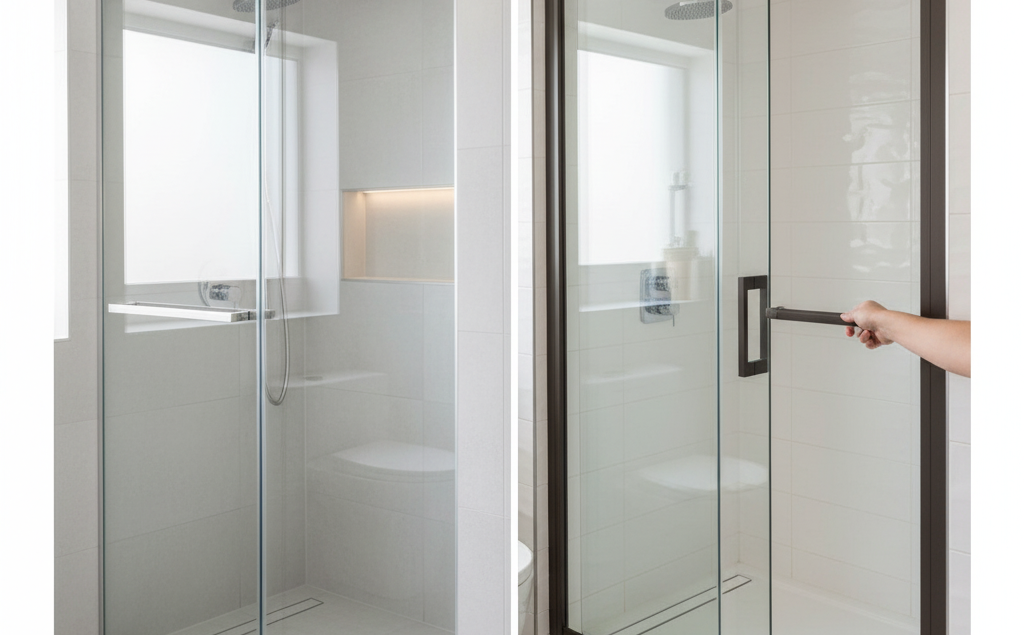Should I Install a Frameless or Framed Sliding Shower Door?
When it comes to modern bathroom design, shower doors can make or break the space’s overall aesthetic and functionality. A well-chosen shower door not only defines the shower area but also contributes to a sense of openness and sophistication. For homeowners deciding between framed and frameless designs, understanding the differences, pros, and cons is crucial before making the investment.
Sliding shower door, in particular, have become a staple in contemporary and compact bathrooms. Their smooth operation and space-saving mechanism make them a perfect choice for homes looking to maximize both style and practicality. The key question for many, however, remains: should you install a framed or frameless sliding shower door?
Why Are Sliding Shower Doors So Popular?
Sliding shower doors are beloved for their ability to save space without sacrificing elegance. Unlike hinged doors that swing outward and require clearance, sliding versions glide smoothly along a track, making them ideal for tight spaces. They create a clean and modern appearance, particularly when paired with clear or frosted glass that allows light to move freely throughout the bathroom.
The aesthetic versatility of sliding door means they complement both minimalist and luxurious interiors. They can turn an ordinary bathroom into a spa-like retreat while providing reliable functionality. In areas with smaller bathroom layouts, such as condos or older homes, sliding shower doors in Berwyn are often the go-to solution for balancing form and function seamlessly.
Framed vs. Frameless Sliding Shower Doors: What’s the Difference?
The difference between framed and frameless sliding shower door primarily lies in their construction. Framed shower doors feature metal frames—usually made of aluminum or stainless steel—surrounding each glass panel. These frames provide additional strength, helping to stabilize thinner glass panels.
Frameless shower doors, on the other hand, use thick tempered glass that requires no surrounding frame. Instead, they rely on discreet brackets and rollers for structural support. The result is a sleek, seamless appearance that showcases the shower interior beautifully.
While both designs serve the same purpose, the aesthetic and maintenance experiences differ considerably. Framed options tend to emphasize structure and contrast, while frameless doors exude elegance and openness.
The Design Appeal of Frameless vs. Framed Shower Doors
Frameless sliding shower doors are highly valued for their minimalist appearance. Without bulky metal edges, they make bathrooms look brighter and more spacious. This transparency allows decorative tile patterns or stonework within the shower to take center stage.
Conversely, framed sliding shower doors bring definition and boldness. Their visible outlines help accentuate design details and create contrast, especially when paired with trendy finishes such as matte black or brushed nickel. For traditional or industrial bathroom designs, framed options provide both stability and character.
Both versions can be customized to match existing hardware, whether that’s faucets, towel racks, or vanity handles, creating a cohesive and refined look.
Durability and Strength
Framed sliding shower doors gain their durability from the surrounding metal frame. Because of this, the glass can be thinner—usually around 3/16 to 1/4 inch thick—while still maintaining structural integrity. The metal frame helps protect the glass edges, minimizing the risk of chips or cracks.
Frameless sliding shower doors, in contrast, rely entirely on the glass itself for strength. They use tempered safety glass that’s 3/8 to 1/2 inch thick. This type of glass is four to five times stronger than regular glass and designed to break into small, safe pieces if ever damaged.
While both options are durable, frameless doors offer a more upscale feel and long-term stability. However, due to the heavier weight of the glass, they require expert installation and high-quality hardware to ensure smooth movement and lasting performance.
Maintenance and Cleaning
Maintenance is one of the biggest factors influencing this decision. Framed shower doors often accumulate water deposits and soap residue along the metal edges and seals. Regular cleaning is needed to prevent corrosion or mold growth in those hard-to-reach areas.
Frameless sliding shower doors, however, are much easier to maintain. With minimal hardware and no metal framing, there are fewer places for grime to build up. A quick wipe with a squeegee after each shower helps keep the glass spotless.
Many frameless doors also come with hydrophobic coatings that repel water, further simplifying cleaning. Over time, this means fewer maintenance costs and a longer-lasting shine.
Water Sealing and Containment
Water control is where framed doors tend to have a small edge. Their tight-fitting seals and framed edges provide a nearly watertight enclosure, reducing the risk of leaks or splashes.
Frameless sliding shower doors use precision engineering and silicone seals at key points to achieve similar containment. However, because there’s less framing, minor leaks can occur if the door isn’t properly installed or the shower base isn’t level. Choosing an experienced installer is essential to ensure water containment remains consistent over time.
Installation Complexity
Installing a framed sliding shower door is generally quicker and more forgiving, especially in older homes where walls may not be perfectly plumb. The framing allows for minor adjustments and helps compensate for uneven surfaces.
Frameless installations, on the other hand, require exact measurements. Even small misalignments can cause gaps or restrict door movement. For this reason, frameless doors should always be installed by professionals who specialize in glass enclosure systems.
Those considering costs and scheduling might also explore What Factors Affect the Price of Sliding Shower Doors, as the installation process, hardware quality, and custom sizing play major roles in the total investment.
Cost Comparison
Framed sliding shower doors are generally more affordable. Depending on size, finish, and glass type, they typically cost between $500 and $1,200. Their lighter weight and easier installation contribute to lower labor costs.
Frameless sliding shower doors fall into a higher price range, averaging $1,000 to $2,500, with fully custom options reaching beyond that. The thicker glass, precise engineering, and aesthetic appeal justify the added expense for many homeowners seeking a luxury bathroom finish.
While frameless doors may cost more upfront, they often add greater value to the home and stand the test of time with less need for replacements.
Style Versatility and Customization
Both types of sliding shower doors can be customized extensively. Framed models allow for diverse finish options—chrome, black, bronze, and even custom powder-coated colors—to match any interior palette.
Frameless models offer flexibility in glass types, from ultra-clear low-iron glass to frosted or textured finishes that enhance privacy. Homeowners can also select from a range of handle styles and track designs to align with their overall décor.
The ability to tailor dimensions and finishes ensures that no matter the bathroom’s size or layout, there’s a perfect sliding shower door solution available.
Safety Features
Both framed and frameless shower doors use tempered glass, designed to handle thermal stress and accidental impact safely. Framed doors have additional protection from the metal edges, while frameless designs depend on glass thickness and structural brackets.
Advanced features such as anti-jump rollers, safety stops, and soft-close mechanisms further improve safety and comfort. These components prevent sudden slamming and ensure the doors glide effortlessly along the track.
Longevity and Value
Framed sliding shower doors are built to last for years with minimal issues when maintained properly. Their reinforced design makes them ideal for family homes and high-traffic bathrooms.
Frameless doors, while requiring a larger initial investment, often last longer thanks to their corrosion-free design and superior glass quality. They elevate the overall aesthetic of a home, which can increase its resale value. For many homeowners, the added elegance and durability make them worth the extra cost.
Sustainability and Efficiency
From an environmental standpoint, frameless shower doors use fewer materials—particularly metal—making them a greener choice in terms of resource use and recyclability. Their transparent design also allows natural and artificial light to pass through more effectively, reducing the need for excessive lighting.
Meanwhile, both door types contribute to better energy efficiency by keeping steam and warmth inside the shower, minimizing the need to reheat water frequently.
Which Option Is Right for You?
The choice between framed and frameless sliding shower door ultimately depends on personal preference, budget, and desired style. Homeowners seeking an affordable, durable, and low-maintenance solution often prefer framed doors. Those aiming for a sleek, luxurious, and contemporary bathroom design tend to favor frameless options.
Both deliver functionality, safety, and elegance, ensuring a stylish addition that enhances daily comfort.
Conclusion
When upgrading your bathroom, it’s worth taking the time to evaluate both framed and frameless sliding shower doors carefully. While framed options provide affordability and structure, frameless designs offer an unmatched sense of openness and elegance that elevates the bathroom’s overall atmosphere.
For homeowners looking for professional installation, Berwyn Glass specializes in custom glass solutions in Berwyn, ensuring that every project—from standard framed systems to high-end frameless designs—is built for lasting beauty, precision, and performance.

